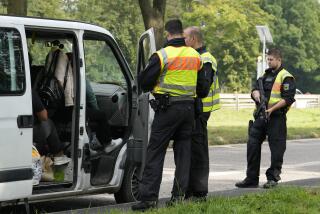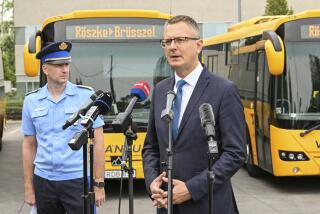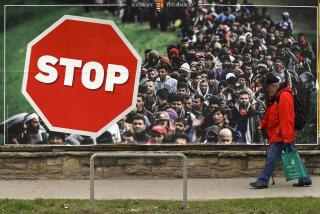Europe’s refugee trail: Bottlenecks ease in some places, remain in others
Reporting from Berlin — Obstacles eased Thursday at the northern and southern ends of Europe’s ever-crowded migrant trail, with Danish authorities moving to open the path for asylum-seekers to head onward to Sweden and Greece largely clearing a huge backlog that had built up on the tiny tourist island of Lesbos.
But fresh confrontations loomed at the midpoint of the snaking thousand-mile pathway, as Hungary’s army conducted exercises on its border with Serbia and its government sought to criminalize passing through Hungarian territory on the way to northern European havens that are deemed more desirable destinations.
In Germany, which is taking in exponentially more migrants and refugees than any other European state, Chancellor Angela Merkel visited a refugee shelter and spoke of hopes that the new arrivals -- many from war-torn Syria and Iraq, others fleeing tumult in Afghanistan and elsewhere -- will be able to find a place in German society.
“Their integration will certainly take place in part by way of the children, who will learn German very quickly,” Merkel told reporters after meeting in the Berlin suburb of Spandau with two asylum-seeking families who have kindergarten-age children.
The German leader has come under fire from some European neighbors and domestic opponents who believe Germany’s generous resettlement policies and willingness to waive EU rules about seeking asylum in the first European country reached are helping to spur what has become one of the continent’s largest-scale displacements since World War II.
Germany has surpassed its previous postwar annual record for taking in those fleeing violence and persecution: the 438,000 who flooded across its frontiers in 1992, seeking to escape the Balkan wars. Vice Chancellor Sigmar Gabriel told lawmakers on Thursday that Germany had received about 450,000 migrants and refugees this year, including more than 100,000 in August.
The forecast of Germany taking in 800,000 this year may prove a low estimate, officials have said.
While praising a plan put forth Wednesday by the head of the European Union’s executive arm to distribute 160,000 refugees among all the bloc’s members, Gabriel also called it a “drop in the ocean.” That proposal needs the endorsement of European officials meeting next week in Brussels.
One bastion of resistance to the presence of migrants and refugees is Hungary, whose right-wing government has bridled at criticism of the harsh treatment reported by those passing through. The police detained a one-day record number of arrivals Wednesday, rounding up more than 3,300 people.
The potential involvement of Hungary’s military in staunching the flow could ratchet up confrontations on the country’s frontier with Serbia. Hungary is nearing completion of a fence along their mutual border stretching more than 100 miles.
Austria, the next stop on the northwest passage, is the final way station on what is for many a destination of Germany. Austrian authorities on Thursday helped hundreds make the trip from the Hungarian border onward to Vienna but were reported to be consulting as to whether continuing the special transport was feasible.
In Denmark, where police this week had tried to block migrants and refugees heading north to Sweden, the crush appeared to ease on Thursday when a highway connecting the Danish peninsula of Jutland to Germany was reopened. But migrants and refugees still risked being stopped if traveling by train.
“The situation changes from hour to hour,” Denmark’s national police said in a statement quoted by the Reuters news agency.
Authorities had initially tried to enforce the provision that anyone not seeking asylum in Denmark could not merely transit its territory. Large numbers of those making the overland journey are trying to reach Sweden, where conditions for seeking asylum are seen as more favorable and many already have a foothold through family ties.
Although much of the resistance to resettlement quotas has been concentrated in EU member states that were formerly part of the Soviet bloc, angry rhetoric has cropped up in more liberal and prosperous Western European countries as well. In the Netherlands, far-right politician Geert Wilders on Thursday characterized the movement of largely Muslim migrants and refugees as an “Islamic invasion.”
Adding to the miseries of the migrant trail, early-autumn weather will soon take a wintry turn. Many asylum seekers are sleeping in the open on Greece’s northern border with Macedonia -- yet another bottleneck -- where they were drenched Thursday by a downpour.
Worsening weather conditions also will make crossings of the Mediterranean from North Africa even more perilous and endanger even those making the short voyage from Turkey’s Aegean coast to the islands of eastern Greece.
Follow @laurakingLAT on Twitter for developments out of the refugee crisis in Europe
More to Read
Sign up for Essential California
The most important California stories and recommendations in your inbox every morning.
You may occasionally receive promotional content from the Los Angeles Times.










